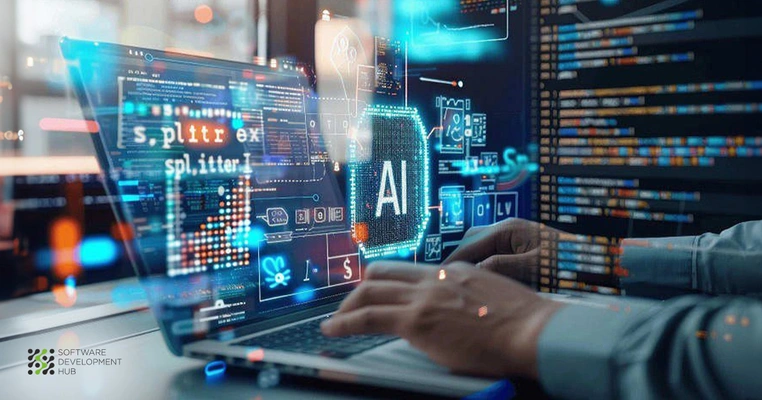AI Developer: Role, Skills, and How to Become One in 2025
The artificial intelligence engineering field is experiencing substantial growth in 2025, with job postings increasing 3.5 times faster than any other job category. According to LinkedIn's Jobs on the Rise 2025 report, 'AI Engineer' has emerged as the fastest-growing job title on the platform, surpassing every other tech role over the past three years.
These market dynamics reflect broader industry trends. The AI market size is projected to reach $243.72 billion in 2025, with growth expectations to $826.73 billion by 2030. We should acknowledge that this expansion creates significant opportunities for software professionals considering specialization in artificial intelligence development.
Career prospects in AI engineering offer substantial financial benefits alongside growth potential. In the United States, artificial intelligence engineers earn median total compensation of approximately $135,000, with experienced professionals commanding up to $190,000 based on expertise, skills, and geographical location.
This article examines the core responsibilities of AI developers, essential skills required for success in 2025, and provides a structured approach to entering this field. Whether you're an experienced software developer or beginning your technology career, we'll outline how to position yourself effectively in this growing sector.
Understanding the Role of an AI Developer
Artificial intelligence developers represent a specialized category of software engineers who focus on building and deploying AI systems and applications. Their expertise combines programming fundamentals with advanced machine learning techniques to create intelligent solutions that address specific business challenges.
What does an AI developer do?
AI developers primarily write code to develop and implement AI-powered applications that simulate human intelligence processes. Their daily responsibilities encompass designing algorithms, building predictive models, preprocessing data, and deploying models into production environments. These professionals collaborate with cross-functional teams, participate in strategy meetings, and explain complex AI systems to non-technical stakeholders. They collect, clean, and preprocess data to ensure quality and accuracy before feeding it into AI systems.
AI developer vs AI engineer vs data scientist
What distinguishes these three roles? While the titles are often used interchangeably, each position has distinct focuses and responsibilities.
Artificial intelligence engineers concentrate primarily on engineering and deployment aspects, including designing scalable architectures, managing cloud infrastructure, and system integration. Their compensation typically reflects this broader scope, with experienced AI engineers earning approximately $159,000 on average.
Data scientists, in contrast, collect and analyze data to extract insights rather than building applications. Their focus centers on identifying patterns and gaining business intelligence from datasets.
The distinction becomes clear when examining primary objectives: AI developers build specific AI applications and integrate models; AI engineers handle broader infrastructure and deployment architecture; data scientists extract meaningful insights from data analysis.
Where AI developers fit in the AI lifecycle
AI developers operate across multiple phases of the AI lifecycle—the iterative process that moves from business problem identification to AI solution deployment. Initially, they coordinate with business leaders to identify automation opportunities. During the data preparation phase, they transform raw information into structured formats suitable for AI processing.
The modeling phase involves experimentation with various approaches, training and testing different models through iterative fine-tuning processes. After evaluation confirms the model meets established business goals, developers deploy it into production environments and establish continuous monitoring to prevent "drift"—performance degradation over time that requires retraining or updates.
This positioning means that while data scientists might identify opportunities and engineers might build supporting infrastructure, AI developers create the actual intelligence that powers business solutions.
Essential Skills and Tools for AI Developers
Artificial intelligence engineers must master a comprehensive set of technical competencies and specialized tools. The field's rapid evolution requires continuous skill development to maintain competitive advantage in the job market.
Programming languages and frameworks
Python serves as the dominant language for AI development, offering readability and extensive library support. Essential frameworks include TensorFlow and PyTorch for deep learning applications, scikit-learn for machine learning tasks, and Hugging Face for natural language processing projects. R provides superior statistical analysis capabilities, while Java delivers enterprise integration functionality. Performance-critical applications with low latency requirements necessitate C++ proficiency.
Machine learning and deep learning knowledge
Strong machine learning fundamentals form the foundation of AI development work. This encompasses supervised and unsupervised learning methodologies, combined with deep learning concepts including neural network architectures. Developers must demonstrate proficiency across diverse algorithms—spanning linear regression through convolutional neural networks—to select optimal models for specific business problems. Model evaluation skills using metrics such as accuracy, precision, and recall remain crucial for validating performance.
Data handling and feature engineering
Feature engineering processes transform raw data into machine-readable formats that optimize model performance. The methodology includes feature creation, transformation, extraction, and scaling techniques. Specific approaches like binning, one-hot encoding, and principal component analysis contribute to more effective predictive models. Data preparation and feature creation typically consume significant portions of development time.
Working with large language models and generative AI
Large language models have fundamentally changed AI development through natural language understanding and generation capabilities. These models typically utilize transformer architecture to predict text based on contextual information. Frameworks like LangChain enable developers to build context-aware applications using LLMs. Prompt engineering, fine-tuning, and RAG (Retrieval Augmented Generation) techniques have become essential competencies for artificial intelligence engineers working with generative AI systems.
How to Become an AI Developer in 2025
Career transition into artificial intelligence development requires systematic skill building and practical experience. The following pathway outlines five essential steps for entering this specialized field.
Step 1: Learn programming and math fundamentals
Python serves as the primary programming language for AI development, though Java and C++ prove valuable for enterprise environments and performance-critical applications. Mathematical foundations are equally important—linear algebra for matrix and vector operations, calculus for optimization algorithms, and probability theory for uncertainty modeling. These mathematical concepts form the framework for understanding AI algorithm functionality. Many successful practitioners begin with courses that integrate programming instruction with AI-specific mathematical applications.
Step 2: Build machine learning and AI foundations
Develop expertise across machine learning categories including supervised, unsupervised, and reinforcement learning approaches. Master fundamental algorithms such as linear regression, decision trees, and support vector machines. Acquire proficiency with key frameworks including TensorFlow, PyTorch, Keras, and scikit-learn. Professional certificate programs from institutions like MIT and Harvard, or specialized online platforms, provide both theoretical understanding and practical implementation experience.
Step 3: Work on real-world projects and open source
Apply acquired skills through projects that address genuine business problems. Contributing to open-source AI projects provides multiple advantages: demonstrating coding capabilities to potential employers, receiving constructive feedback for skill improvement, and building professional networks. Open-source contributions also develop collaborative development practices and version control proficiency—essential skills for professional environments.
Step 4: Learn MLOps and deployment practices
After mastering model development, focus on operational implementation. Deploy models in production environments using cloud platforms such as AWS SageMaker or Google Cloud AI. Understand continuous integration, continuous delivery, and continuous training practices for ML systems. Develop expertise in data pipeline automation and model monitoring to maintain long-term performance.
Step 5: Create a portfolio and apply for roles
Build a portfolio demonstrating diverse projects with end-to-end problem-solving capabilities. Include projects featuring real-world applications and measurable business impacts. Apply for positions ranging from entry-level roles to specialized AI engineering positions based on experience level. Entry-level positions typically require demonstrated proficiency through completed projects or open-source contributions.
Career Growth, Salaries, and Future Outlook
What does the current market landscape reveal about AI engineering careers? The demand for AI talent has reached unprecedented levels, with opportunities expanding across diverse industry sectors. Traditional technology roles are being reshaped by the specialized requirements of artificial intelligence development.
AI developer salary trends in 2025
Current compensation data reflects the premium placed on AI engineering expertise. The average AI developer in the US earns approximately $112,266 annually as base salary. Senior professionals command significantly higher compensation, with experienced AI developers earning up to $200,000.
Experience-based salary progression demonstrates clear market tiers: entry-level roles (0-1 year) begin around $143,000, professionals with 2-3 years earn approximately $172,000, and those with 10+ years experience command $269,000+. Market analysis shows AI salaries have increased by more than $50,000 compared to previous years.
Industries hiring AI developers
The recruitment landscape extends far beyond traditional technology companies. While tech firms lead hiring volumes, healthcare, finance, and automotive sectors typically provide the most competitive compensation packages. Major recruiters include Microsoft, Amazon (781 positions), Apple (663 positions), and TikTok (617 positions).
Employer diversity spans multiple sectors: Deloitte, Salesforce, Netflix, Princeton University, and Starbucks represent the breadth of organizations seeking AI expertise. This range illustrates how AI specialization has become valuable across educational institutions, enterprise services, and consumer-facing businesses.
Career path: junior to senior roles
Professional advancement in AI engineering follows established patterns:
Entry-level developers implement basic AI models under supervision and focus on coding fundamentals. Mid-level professionals manage complex projects, collaborate with data science teams, and may lead small development groups. Senior developers oversee complete project lifecycles, mentor junior staff, and contribute to strategic technology decisions. Advanced professionals often transition to AI architect positions or management roles, where they design organizational AI strategies.
Future of artificial intelligence engineering
Market projections indicate sustained growth for AI careers. The industry is expected to reach $826 billion by 2030, with related computer roles showing 18% job growth between 2023-2033.
However, the field presents unique challenges. AI technology is simultaneously creating new opportunities while automating existing tasks, particularly at entry levels. Professionals must continuously develop specialized skills to maintain competitive advantage.
Conclusion
Artificial intelligence development represents one of the most significant opportunities in the current technology landscape. This article has examined how professionals in this field combine programming capabilities with machine learning expertise to build solutions that address real business challenges across various industries.
Compensation packages reflect the specialized nature of this work, with entry-level positions offering $143,000 and experienced professionals earning $269,000+ annually . These figures demonstrate both the skill requirements and the value organizations place on AI development expertise.
Career prospects remain strong given market projections to $826 billion by 2030 and expected job growth of 18% for related computer roles between 2023-2033 . However, the field demands continuous skill development as new frameworks, models, and implementation techniques emerge regularly.
The five-step development pathway we've outlined provides a structured approach whether you're transitioning from traditional software development or entering the technology field directly. Practical experience through meaningful projects distinguishes successful AI developers from those with purely theoretical knowledge.
Organizations across healthcare, finance, automotive, and technology sectors continue expanding their AI initiatives, creating sustained demand for qualified professionals. Your entry into AI development depends on building the right foundation, maintaining continuous learning habits, and applying knowledge through hands-on project work.
Categories
About the author
Share
Need a project estimate?
Drop us a line, and we provide you with a qualified consultation.







